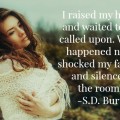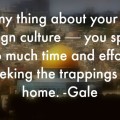This article was previously published on “Hi, I’m Bekki.” Republished with permission.
A couple of weeks ago, I was talking to my counselor about what we’ve euphemistically termed the “crummy days,” the period in which I first experienced the symptoms of bipolar disorder, and they seemed to assault me with breathtaking ferocity. These conversations always leave me feeling numb, vulnerable, and raw. After our chat, my counselor asked, “Are you a survivor?” I responded with a resounding yes without thinking.
 I haven’t been able to stop thinking about her question, and now I wish that I could change my answer. No, I’m not a survivor, and it’s unsettling to think of myself as one. I associate survivors with people who had a traumatic experience—people who survived terrible accidents or natural disasters, cancer patients who are in remission, people who escaped a life-or-death situation. These people came out on the other side, and some were completely cured.
I haven’t been able to stop thinking about her question, and now I wish that I could change my answer. No, I’m not a survivor, and it’s unsettling to think of myself as one. I associate survivors with people who had a traumatic experience—people who survived terrible accidents or natural disasters, cancer patients who are in remission, people who escaped a life-or-death situation. These people came out on the other side, and some were completely cured.
With mental illness, though, there isn’t a cure. There isn’t a moment where I’ll come out on the other side, where I’ll wake up in the morning knowing that my crisis was a one time deal, and it will never happen again. Perhaps a full-blown crisis will not occur again, but I can expect small crises and occasional symptoms in the future. Sometimes, that seems lousy, and I feel frustrated knowing that my life is forever altered. It’s not exactly comforting that this mental illness and I will always be chums, two peas-in-a-pod, wedded until death do us part.
So, if I’m not a survivor, then what am I? I’m a bit too generous and prefer to think of myself as a fighter, a trier, or a charming gladiator—someone who is constantly engaged in this lifetime struggle. Most of the time, my life is good, happy, and ordinary. But when the small crises come, it’s so much easier to approach these times from the perspective of a fighter, someone who recognizes that while these tough spots are inevitable, life will resume happily and beautifully shortly after.
 And from the perspective of a fighter, it is helpful for me to remember that I wield some power and possess a degree of control over my illness. I am the agent of the treatments for my health. I utilize the resources and supports available to me, I thank God for the magic meds that I take, and I surround myself with people who de-stigmatize mental illness and help me feel grateful to be me.
And from the perspective of a fighter, it is helpful for me to remember that I wield some power and possess a degree of control over my illness. I am the agent of the treatments for my health. I utilize the resources and supports available to me, I thank God for the magic meds that I take, and I surround myself with people who de-stigmatize mental illness and help me feel grateful to be me.
I try to take active control over the things that I can control. And when I do this, the desire for “normalcy” tends to dissipate. Instead of including mental illness within the rubric of normalcy, I feel far more interested in understanding the disabled mind and in re-imagining my identity as someone who is differently-abled and astonishingly awesome.
I am glad that there are survivors and that people come out on the other side. But I am also glad that I am not a survivor because I am consistently in awe of how much I learn and grow during this lifelong battle. Society seems to perpetuate this desire for the end goal, the final state of being, or the ultimate result. But I think there is glory in reaching, too.
By Bekki
About Guest Author
Twitter •






